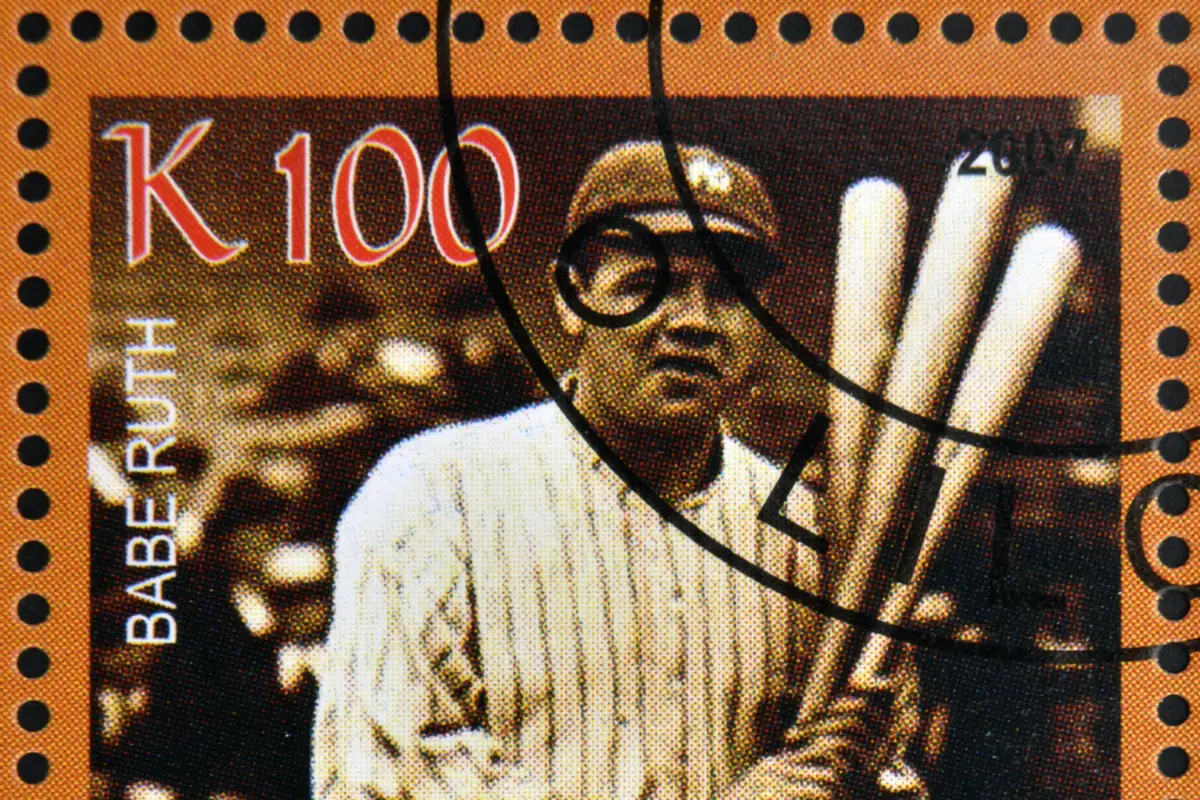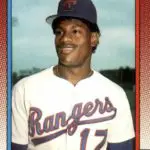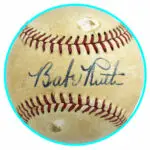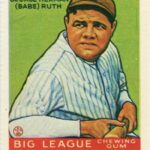The practice of reprinting baseball cards and football cards that are old, rare, or for any reason valuable dates back several decades.
For those new to the card collecting game, it’s in most cases their only chance at having cards featuring some of the all time greats like Babe Ruth.
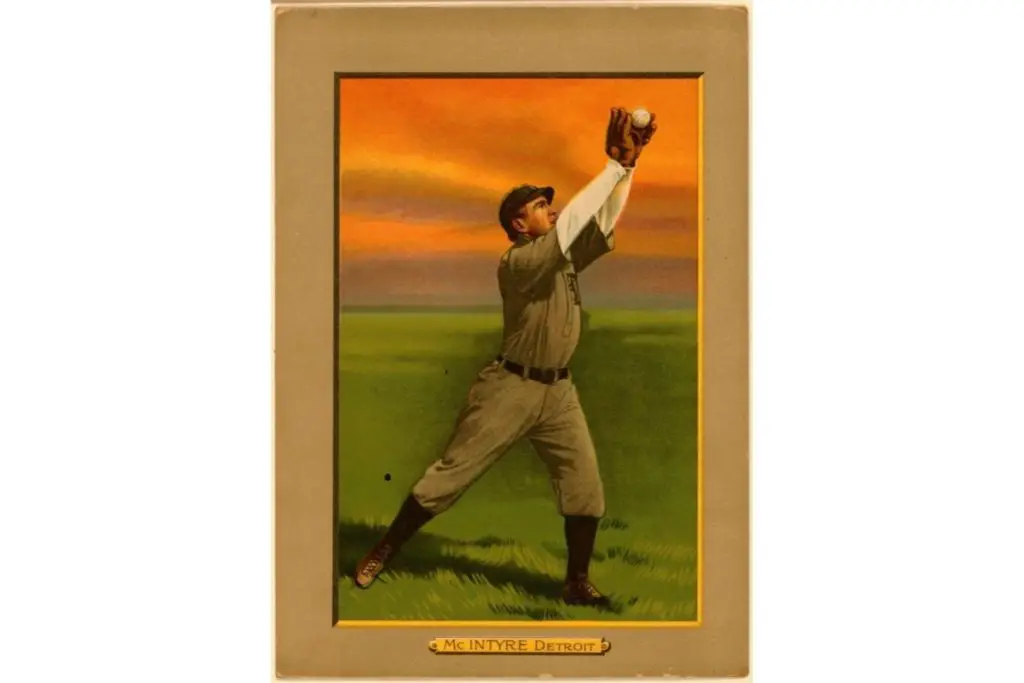
However, while the more reputable companies (such as Topps) included a definitive ‘reprint’ disclaimer on the backs of all their reprinted cards, this wasn’t the case for every company.
So, how can you tell if a baseball card or a football card is a reprint when the card doesn’t explicitly tell you? The following will tell you all you need to know.
What’s The Difference Between A Reprinted Card And A Counterfeit (Fake) Card?
It’s important to know the distinction between a card that’s been reprinted and a card that’s been counterfeited (and is therefore not an authentic card).
A counterfeit card, be it a baseball card or a football card, is created purely to mislead collectors and make money off what is in all intents and purposes a dud.
A lot of these fake cards are aged in order to make them look more like real cards.
A reprint card, on the other hand, is printed to serve as a collector’s item despite it not being the original print of the card.
While some of the more reputable companies include the word ‘reprint’ on the backs of their reprinted cards, some companies don’t do this, so it’s harder to tell if a card is an original or not.
The line between a reprinted card and a fake card can sometimes be blurred; a lot of scammers attempt to erase the ‘reprint’ disclaimer from the backs of reprinted cards so that collectors will think it’s an original.
On eBay and other auction websites there are often cards listed as originals when in actual fact their authenticity is… questionable, to say the least.
Reprinted Baseball Cards: What To Look For
There are a number of things you can look for in order to discern whether a card is a reprint or an original.
We’ll first look at baseball cards, and then we’ll look at football cards, but most of the things you should be looking for are the same regardless of the type of card.
When it comes to baseball cards, the first thing you should be looking for is the more obvious differences.
These will usually be the differences most easy to spot, and include things like the text or the copyright date which indicates that the card is a reprint, or in some cases a big difference in size compared to the real original card.
The card might also have the wrong back when compared to the original. Even when you’re buying a card online, these differences tend to be obvious, but don’t think a scammer won’t use pictures of the actual original card to try to sell you a reprint.
Some reprinted cards (most notably, in recent years, cards printed by Goudeys) are just generally of a lesser quality than the original cards, to the point where you’re able to tell it’s a reprint simply by how it looks, or the card stock it’s printed on.
Another difference to look out for is the dimensions of the face of the card and the back of the card. Compare these dimensions with those of other cards.
You can also check price guides, which should list the dimensions of standard issue cards.
Also worth noting is the dimensions of the printing itself; things like the size of the image on the card, the borders, and the text. Some reprints will have identical printing but will be the wrong size, or vice versa.
Look out for solid areas. You can check for these using either a magnifying glass or a microscope. Some original cards have a solid border around the picture and the name of the player, so if a card doesn’t feature this kind of border, you’ll know it’s a reprint.
Another thing to watch out for is the weight of the card, which should give you an idea of which cardstock was used.
This isn’t always a sign that it’s a reprint, though; small differences may just be down to natural variation amongst the cards.
You should also be analysing the appearance of the card stock, and the surfaces; things like the color, the texture, the feel. A lot of the time companies struggle to provide reprints with the right gloss.
You can also do an opacity test on the card by shining light through it (although the opacity of original cards can vary, so best to read up on your particular card’s online), as well as a black light test to discern ink from cardboard.
Reprinted Football Cards: What To Look For
When trying to tell if a football card is an original or a reprint, you’ll be looking for all the same things. If you can find a decent image of the original card online, then use this to compare it with the card you suspect to be a reprint.
Or, if you can, compare it to a card from the same issue. Certain lines of cards will all share similar features.
Be sure to check the reputation of the seller if you’re buying cards online, as scammers are rife when it comes to football cards.
Check the seller’s profile; you should be able to see feedback from buyers, and if the feedback seems negative, it’s likely they’re not selling the real thing.
Remember, if you already own the card, you can always take it to a professional. They’ll be far more experienced in telling the difference between an original football card and a reprint.
Conclusion: How To Tell If A Card Is A Reprint
There are a number of ways to tell if a baseball card or football card is a reprint, rather than an original.
Compare the card to the original card (even if it’s just a picture of the first print online), investigate the seller if you’re buying cards online, and check out the card’s dimensions (both in terms of size and printing), its solid areas, its weight, its appearance and opacity.
- Bo Jackson Rookie Cards for savvy collectors - March 19, 2023
- Bo Bichette Baseball Rookie Cards - March 11, 2023
- Great Value baseball cards from the 60’s under $500 - March 4, 2023


